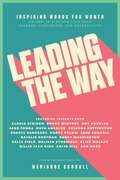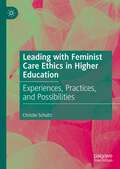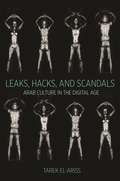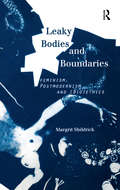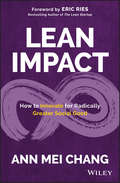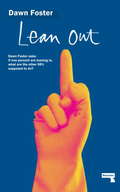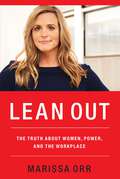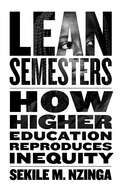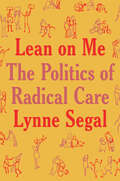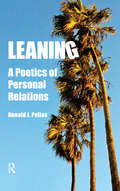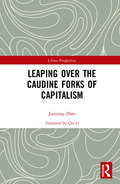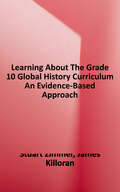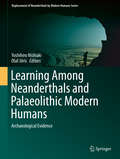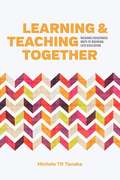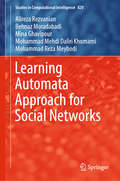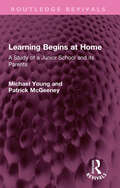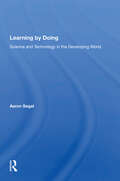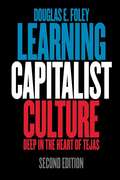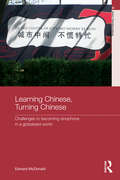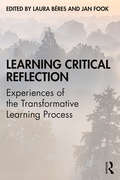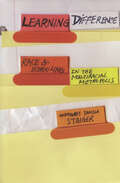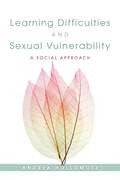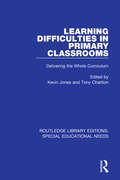- Table View
- List View
Leading the Way: Inspiring Words for Women on How to Live and Lead with Courage, Confidence, and Authenticity
by Marianne SchnallFrom the author of What Will It Take to Make a Woman President? and founder of Feminist.com and WhatWillItTake.com, Marianne Schnall, a rousing call to action for women everywhere to not only see themselves as leaders, but also discover that when more women step up and speak out, powerful things can happen. In Leading the Way, journalist, author, and activist Marianne Schnall shares the most insightful and thought-provoking reflections from her interviews with remarkable public figures to illuminate how every woman can rise up and become the change-enacting leader she was born to be. It also champions women who are looking to become more empowered in their professional and personal lives—providing insights on how to be willing to take risks (and make mistakes), getting clear about what success actually means, how to create new paradigms of leadership and power, and so much more. Featuring personal anecdotes and wisdom from Oprah Winfrey, Gloria Steinem, Maya Angelou, Nancy Pelosi, Amy Poehler, Anita Hill, Sheryl Sandberg, Kerry Washington, Natalie Portman, Billie Jean King, and Ana Navarro, just to name a few, the words in this book will encourage women everywhere to know their power, use their voice, and become a true agent of change—not only in their own lives, but also in the world.
Leading with Feminist Care Ethics in Higher Education: Experiences, Practices, and Possibilities
by Christie SchultzThis book explores how academic leaders throughout higher education experience and practice care and the ethics of care. Drawing on a narrative inquiry study of experiences and practices of feminist care ethics in higher education leadership, Schultz counters academic norms, including expectations of competition and criticism across all activities, by uncovering the common experiences of academic leaders who intentionally adopt practices guided by an ethics of care and relationality. Within the context of institutions of higher education responding to present-day social movements, the book highlights how practices of care-centered leadership can enable change that begins on campus and reaches outwards to positively impact the community.
Leaks, Hacks, and Scandals: Arab Culture in the Digital Age (Translation/transnation Ser. #40)
by Tarek El-ArissHow digital media are transforming Arab culture, literature, and politicsIn recent years, Arab activists have confronted authoritarian regimes both on the street and online, leaking videos and exposing atrocities, and demanding political rights. Tarek El-Ariss situates these critiques of power within a pervasive culture of scandal and leaks and shows how cultural production and political change in the contemporary Arab world are enabled by digital technology yet emerge from traditional cultural models.Focusing on a new generation of activists and authors from Egypt and the Arabian Peninsula, El-Ariss connects WikiLeaks to The Arabian Nights, Twitter to mystical revelation, cyberattacks to pre-Islamic tribal raids, and digital activism to the affective scene-making of Arab popular culture. He shifts the epistemological and historical frameworks from the postcolonial condition to the digital condition and shows how new media challenge the novel as the traditional vehicle for political consciousness and intellectual debate.Theorizing the rise of “the leaking subject” who reveals, contests, and writes through chaotic yet highly political means, El-Ariss investigates the digital consciousness, virality, and affective forms of knowledge that jolt and inform the public and that draw readers in to the unfolding fiction of scandal.Leaks, Hacks, and Scandals maps the changing landscape of Arab modernity, or Nahda, in the digital age and traces how concepts such as the nation, community, power, the intellectual, the author, and the novel are hacked and recoded through new modes of confrontation, circulation, and dissent.
Leaky Bodies and Boundaries: Feminism, Postmodernism and (Bio)ethics
by Margrit ShildrickDrawing on postmodernist analyses, Leaky Bodies and Boundaries presents a feminist investigation into the marginalization of women within western discourse that denies female moral agency and embodiment. With reference to contemporary and historical issues in biomedicine, the book argues that the boundaries of both the subject and the body are no longer secure. The aim is both to valorise women and to suggest that 'leakiness' may be the very ground for a postmodern feminist ethic. The contribution made by Leaky Bodies and Boundaries is to go beyond modernist feminisms to radically displace the mechanisms by which women are devalued. The anxiety that postmodernism cannot yield an ethics, nor advance feminist concerns is addressed. This book will provide invaluable reading for those studying feminist philosophy, cultural studies and sociology.
Lean Impact: How to Innovate for Radically Greater Social Good
by Ann Mei ChangDespite enormous investments of time and money, are we making a dent on the social and environmental challenges of our time? What if we could exponentially increase our impact? Around the world, a new generation is looking beyond greater profits, for meaningful purpose. But, unlike business, few social interventions have achieved significant impact at scale. Inspired by the modern innovation practices, popularized by bestseller The Lean Startup, that have fueled technology breakthroughs touching every aspect of our lives, Lean Impact turns our attention to a new goal - radically greater social good. Social change is far more complicated than building a new app. It requires more listening, more care, and more stakeholders. To make a lasting difference, solutions must be embraced by beneficiaries, address root causes, and include an engine that can accelerate growth to reach the scale of the need. Lean Impact offers bold ideas to reach audacious goals through customer insight, rapid experimentation and iteration, and a relentless pursuit of impact. Ann Mei Chang brings a unique perspective from across sectors, from her years as a tech executive in Silicon Valley to her most recent experience as the Chief Innovation Officer at USAID. She vividly illustrates the book with real stories from interviews with over 200 organizations across the US and around the world. Whether you are a nonprofit, social enterprise, triple bottom line company, foundation, government agency, philanthropist, impact investor, or simply donate your time and money, Lean Impact is an essential guide to maximizing social impact and scale.
Lean Out
by Dawn FosterSheryl Sandberg's business advice book, Lean In, was heralded as a defining moment in attitudes to women in business. But for all its commercial success, it proposed a model of feminism that was individualistic and unthreatening to capital.In her powerful debut work Lean Out, acclaimed journalist Dawn Foster unpicks how the purportedly feminist message of Sandberg's book neatly exempts patriarchy, capitalism and business from any responsibility for changing the position of women in contemporary culture. It looks at the rise of a corporate '1% feminism', and at how feminism has been defanged and depoliticised at a time when women have borne the brunt of the financial crash and the gap between rich and poor is widening faster than ever. Surveying business, media, culture and politics, Foster asks whether this 'trickledown' feminism offers any material gain for women collectively, or acts as mere window-dressing PR for the corporations who caused the financial crash. She concludes that 'leaning out' of the corporate model is a more effective way of securing change than leaning in.From the Trade Paperback edition.
Lean Out: The Struggle For Gender Equality In Tech And Start-up Culture
by Elissa ShevinskyWhy aren't the great, qualified women already in tech being hired or promoted? Should people who don't fit in seek to join an institution that is actively hostile to them? Does the tech industry deserve women leaders? The split between the stated ideals of the corporate elite and the reality of working life for women in the tech industry--whether in large public tech companies or VC-backed start-ups, in anonymous gaming forums, or in Silicon Valley or Alley--seems designed to crush women's spirits. Corporate manifestos by women who already fit in (or who are able to convincingly fake it) aren't helping. There is a high cost for the generation of young women and transgender people currently navigating the harsh realities of the tech industry, who gave themselves to their careers only to be ignored, harassed and disrespected. Not everyone can be a CEO; not everyone is able to embrace a workplace culture that diminishes the contributions of women and ignores real complaints. The very culture of high tech, where foosball tables and endless supplies of beer are de facto perks, but maternity leave and breast-feeding stations are controversial, is designed to appeal to young men. Lean Out collects 25 stories from the modern tech industry, from people who fought GamerGate and from women and transgender artists who have made their own games, from women who have started their own companies and who have worked for some of the most successful corporations in America, from LGBTQ women, from women of color, from transgender people and people who do not ascribe to a gender. All are fed up with the glacial pace of cultural change in America's tech industry. Included are essays by anna anthropy, Leigh Alexander, Sunny Allen, Lauren Bacon, Katherine Cross, Dom DeGuzman, FAKEGRIMLOCK, Krys Freeman, Gesche Haas, Ash Huang, Erica Joy, Jenni Lee, Katy Levinson, Melanie Moore, Leanne Pittsford, Brook Shelley, Elissa Shevinsky, Erica Swallow, and Squinky. Edited and selected by entrepreneur and tech veteran Elissa Shevinsky, Lean Out sees a possible way forward that uses tech and creative disengagement to jettison 20th century corporate culture: ''I've figured out a way to create safe space for myself in tech,'' writes Shevinsky. ''I've left Silicon Valley, and now work remotely from home. I adore everyone on my team, because I hired them myself.
Lean Out: The Truth About Women, Power, and the Workplace
by Marissa OrrMore than fifty years since the passage of the Equal Pay Act, the wage gap still hovers at 80 percent. Half a billion dollars are spent annually on corporate diversity programs, yet only 5 percent of CEOs in the Fortune 500 are women. Lean Out is an ambitious attempt to answer the question few dare to ask: What have we gotten wrong about women at work? Based on in-depth research and personal experiences, Lean Out is inspired by the journey of Marissa Orr, a single mom of three trying to succeed in her fifteen-year career at the world’s top tech giants. In an eye-opening account, Orr exposes the systemic dysfunction at the heart of today’s most powerful corporations and how their pursuit to close the gender gap has come at the expense of female well-being. “Fewer women at the top is a clear signal that the system is broken,” says Orr. “With female-dominant strengths such as empathy and consensus-building being the future of business, the headlines forecast that women will dominate the future generations of corporate leaders. But that won’t happen until prescriptions for success stop requiring women to act more like men, mistaking traits such as empathy as signals of weakness.” Lean Out provides a new and refreshingly candid perspective on what it’s really like for today’s corporate underdogs, while challenging modern feminist rhetoric and debunking the belief that everyone has to be the same in order to be equal. Offering compelling new arguments for the reasons more women don’t make it to the top, Lean Out presents a revolutionary path forward, to change the life trajectories of women in the corporate world and beyond.
Lean Semesters: How Higher Education Reproduces Inequity (Critical University Studies)
by Sekile M. NzingaMore Black women are graduating with advanced degrees than ever before. Despite the fact that their educational and professional opportunities should be expanding, highly educated Black women face strained and worsening economic, material, and labor conditions in graduate school and along their academic career trajectory. Black women are less likely to be funded as graduate students, are disproportionately hired as contingent faculty, are trained and hired within undervalued disciplines, and incur the highest levels of educational debt. In Lean Semesters, Sekile M. Nzinga argues that the corporatized university—long celebrated as a purveyor of progress and opportunity—actually systematically indebts and disposes of Black women's bodies, their intellectual contributions, and their potential en masse. Insisting that "shifts" in higher education must recognize such unjust dynamics as intrinsic, not tangential, to the operation of the neoliberal university, Nzinga draws on candid interviews with thirty-one Black women at various stages of their academic careers. Their richly varied experiences reveal why underrepresented women of color are so vulnerable to the compounded forms of exploitation and inequity within the late capitalist terrain of this once-revered social institution.Amplifying the voices of promising and prophetic Black academic women by mapping the impact of the current of higher education on their lives, the book's collective testimonies demand that we place value on these scholars' intellectual labor, untapped potential, and humanity. It also illuminates the ways past liberal feminist "victories" within academia have yet to become accessible to all women. Informed by the work of scholars and labor activists who have interrogated the various forms of inequity produced and reproduced by institutions of higher education under neoliberalism, Lean Semesters serves as a timely and accessible call to action.
Lean on Me: A Politics of Radical Care
by Lynne SegalHave you ever relied on the kindness of strangers? What brings people together to find hope and solidarity? What do we owe each other as citizens and comrades?Questions of care, intimacy, education, meaningful work, and social engagement lie at the core of our ability to understand the world and its possibilities for human flourishing. In Lean On Me feminist thinker Lynne Segal goes in search of hope in her own life and in the world around her. She finds it entwined in our intimate commitments to each other and our shared collective endeavours.Segal calls this shared dependence 'radical care'. In recounting from her own life the moments of motherhood, and of being on the front line of second-wave feminism, she draws upon lessons from more than half a century of engagement in left feminist politics, with its underlying commitment to building a more egalitarian and nurturing world. The personal and the political combine in this rallying cry to transform radically how we approach education, motherhood, and our everyday vulnerabilities of disability, ageing, and enhanced needs.Only by confronting head-on these different forms of interdependence and care can we change the way we think about the environment and learn to struggle — together —against impending climate catastrophe.
Leaning: A Poetics of Personal Relations (Writing Lives: Ethnographic Narratives)
by Ronald J PeliasRonald J Pelias explores leaning as a metaphor for analyzing interpersonal interaction. Bodies leaning toward one another are engaged, developing the potential for long-lasting, meaningful relationships. But this ideal is not often realized. Pelias makes use of a wide variety of tools such as personal narrative, autoethnography, poetic inquiry and performative writing in his exploration of the physical space of relationships. This deeply personal work is essential for scholars and students of qualitative research and autoethnography.
Leaping Over the Caudine Forks of Capitalism (China Perspectives)
by Zhao JiaxiangIn the four volumes of The Development Trajectory of Eastern Societies and the Theories and Practices of Socialism, the author re-examines the Marx and Engel’s theories on the development trajectory of Eastern societies by integrating theoretical analysis of Marxist theories and a historical investigation of socialist revolution and construction around the world. This volume discusses the desire of the Russian commune to “leap over the Caudine Forks of capitalism,” which means to avoid the torments of the capitalist system, according to Marx and Engels’ theories. The author argues that it is essential to use the logic intrinsic in Marx and Engels’ own works rather than those of subsequent disciples such as Lenin as well as other leaders in the Soviet Union or within China’s contemporary socialism. Readers who study Marxism, Marxist philosophy, philosophical history, and the history of philosophy will find this volume interesting.
Learn to Write Badly
by Michael BilligModern academia is increasingly competitive yet the writing style of social scientists is routinely poor and continues to deteriorate. Are social science postgraduates being taught to write poorly? What conditions adversely affect the way they write? And which linguistic features contribute towards this bad writing? Michael Billig's witty and entertaining book analyses these questions in a quest to pinpoint exactly what is going wrong with the way social scientists write. Using examples from diverse fields such as linguistics, sociology and experimental social psychology, Billig shows how technical terminology is regularly less precise than simpler language. He demonstrates that there are linguistic problems with the noun-based terminology that social scientists habitually use - 'reification' or 'nominalization' rather than the corresponding verbs 'reify' or 'nominalize'. According to Billig, social scientists not only use their terminology to exaggerate and to conceal, but also to promote themselves and their work.
Learning About the Grade 10 Global History Curriculum: An Evidence-Based Approach
by James Killoran Stuart ZimmerThis book is organized around the New York State Grade 10 Social Studies Framework. If it has anything to do with the Grade 10 curriculum in Social Studies, it is covered in this book. The book is designed to help you do your best in Global History and Geography. To accomplish that end, the book is divided into three parts: Introductory Unit, Content Chapters, and Final Review Unit.
Learning Among Neanderthals and Palaeolithic Modern Humans: Archaeological Evidence (Replacement of Neanderthals by Modern Humans Series)
by Yoshihiro Nishiaki Olaf JörisThis book is based on the research performed for the Replacement of Neanderthals by Modern Humans Project. The central issue of the project is the investigation of possible differences between the two populations in cognitive ability for learning. The project aims to evaluate a unique working hypothesis, coined as the learning hypothesis, which postulates that differences in learning eventually resulted in the replacement of those populations. The book deals with relevant archaeological records to understand the learning behaviours of Neanderthals and modern humans. Learning behaviours are conditioned by numerous factors including not only cognitive ability but also cultural traditions, social structure, population size, and life history. The book addresses the issues in two parts, comparing learning behaviours in terms of cognitive ability and social environments, respectively. Collectively, it provides new insights into the behavioural characteristics of Neanderthals and modern humans from a previously overlooked perspective. Furthermore, it highlights the significance of understanding learning in prehistory, the driving force for any development of culture and technology among human society.
Learning And Teaching Together: Weaving Indigenous Ways Of Knowing Into Education
by Michele Td TanakaTeachers unfamiliar with Aboriginal approaches to learning are seeking ways to respectfully weave Aboriginal content into their lessons. This book introduces an indigenist approach to education. It recounts how pre-service teachers immersed in a crosscultural course in British Columbia began to practise Indigenous ways of knowing. Working alongside Indigenous wisdom keepers, they transformed earth fibres into a mural and, in the process, their own ideas about learning and teaching. By revealing how these students worked to integrate Indigenous ways of knowing into their practice, this book opens a path for teachers to nurture indigenist crosscultural understanding in their classrooms.
Learning Automata Approach for Social Networks (Studies in Computational Intelligence #820)
by Alireza Rezvanian Mohammad Reza Meybodi Behnaz Moradabadi Mina Ghavipour Mohammad Mehdi Daliri KhomamiThis book begins by briefly explaining learning automata (LA) models and a recently developed cellular learning automaton (CLA) named wavefront CLA. Analyzing social networks is increasingly important, so as to identify behavioral patterns in interactions among individuals and in the networks’ evolution, and to develop the algorithms required for meaningful analysis. As an emerging artificial intelligence research area, learning automata (LA) has already had a significant impact in many areas of social networks. Here, the research areas related to learning and social networks are addressed from bibliometric and network analysis perspectives. In turn, the second part of the book highlights a range of LA-based applications addressing social network problems, from network sampling, community detection, link prediction, and trust management, to recommender systems and finally influence maximization. Given its scope, the book offers a valuable guide for all researchers whose work involves reinforcement learning, social networks and/or artificial intelligence.
Learning Begins at Home: A Study of a Junior School and its Parents (Routledge Revivals)
by Michael Young Patrick McGeeneyFirst published in 1968, Learning Begins at Home records an attempt by two researchers to initiate and assess an innovation in a school in a working-class neighbourhood. The influence of parents upon children’s achievement is a platitude of education. The vital question is whether schools can become centres for education for adults as well as children, influencing the parents directly, and the children indirectly through the parents. The research reported in this book suggests that it would be worthwhile for teachers to give more of their time to cooperation with parents. This book will be of interest to students of education and sociology.
Learning By Doing: Science And Technology In The Developing World
by Aaron SegalScience and technology capabilities are crucial to the economic growth of developing countries and to their ability to compete in the world economy. What factors enable some countries to successfully adapt technology to create indigenous capabilities and what factors cause others to fail? In this first global survey of science and technology capabilities in developing countries, the authors examine the experiences of Africa, the Caribbean, Latin America, the Middle East, China, India, and East Asia. Specialists in science and technology policies in these regions emphasize learning by doing: using available science and technology in its various applications--the shop floor, universities, and research institutes--to eventually develop indigenous capabilities. The authors consider why such capabilities have emerged in some societies but not in others and discuss their importance for domestic and international relations. Also considered are the implications of the "learning by doing" process for international relations, international trade, regional studies, science and technology policy, and management studies. This unique survey will interest a large audience, from technology policymakers and regional specialists to business managers, and officials. It will serve as a reference guide to the current state of science and technology policies in every region of the world and as a framework for analyzing and understanding how science and technology capabilities are being developed.
Learning Capitalist Culture: Deep in the Heart of Tejas (Contemporary Ethnography)
by Douglas E. FoleyLearning Capitalist Culture presents an updated ethnographic study of the small, economically depressed, predominantly Mexican American south Texas town. Many communities in the Southwest, North Town has undergone cultural and political change since the late 1960s, when the Chicano civil rights movement emerged and challenged the segregated racial order. The resulting racial confrontation between Mexican's and Anglo's created new tensions and problems for North Town youth. <p><p> Douglas E. Foley examines the way in which these youth learn traditional American values through participation in sports, membership in formal and informal social groups, dating, and interactions with teachers in the classroom. Foley shows how the rituals involved in these activities tend to preserve or reproduce class and gender inequalities, even as Mexicanos transform the racial order. This edition contains updated sections on theory and field methods, as well as an epilogue that revisits many of the characters in the original ethnographic research.
Learning Chinese, Turning Chinese: Challenges to Becoming Sinophone in a Globalised World (Asia's Transformations)
by Edward McDonaldIn this book Edward McDonald takes a fresh look at issues of language in Chinese studies. He takes the viewpoint of the university student of Chinese with the ultimate goal of becoming 'sinophone': that is, developing a fluency and facility at operating in Chinese-language contexts comparable to their own mother tongue. While the entry point for most potential sinophones is the Chinese language classroom, the kinds of "language" and "culture" on offer there are rarely questioned, and the links between the forms of the language and the situations in which they may be used are rarely drawn. The author’s explorations of Chinese studies illustrate the crucial link between becoming sinophone and developing a sinophone identity – learning Chinese and turning Chinese. Including chapters on: relating text to context in learning Chinese the social and political contexts of language learning myths about Chinese characters language reform and nationalism in modern China critical discourse analysis of popular culture ethnicity and identity in language learning. This book will be invaluable for all Chinese language students and teachers, and those with an interest in Chinese linguistics, linguistic anthropology, critical discourse analysis, and language education. Edward McDonald is currently Lecturer in Chinese at the University of Auckland, and has taught Chinese language, music, linguistics and semiotics at universities in Australia, China, and Singapore.
Learning Critical Reflection: Experiences of the Transformative Learning Process
by Jan Fook Laura BéresLearning Critical Reflection documents the actual learning experiences of social work students and practitioners. It explores how a more in-depth understanding of the process of learning, combined with an analysis of how to critically reflect, will help improve the learning process. The contributors are all professionals who have learnt, in a formalised way, how to critically reflect on their practice. They speak in depth, and with feeling, about their experiences, how downsides and upsides worked together to transform the way they understood themselves, their professional identity, and their practice. Existing literature about critical reflection is reviewed, identifying the details of learning, and pulling no punches in recognising the difficulty and complexity of becoming transformed through this learning process. The editors of this book also contribute their own reflections on learning how to teach critical reflection and include the findings of a research study conducted on students’ learning. Edited by two experienced educators, this book showcases the process of learning, from the perspective of the learners, in order that educators and students, managers, supervisors, and frontline practitioners alike, may make the most of opportunities to critically reflect in both educational and workplace settings. It should be considered essential reading for social work students, practitioners, and educators.
Learning Difference: Race and Schooling in the Multiracial Metropolis
by Annegret Daniela StaigerThis ethnographic study of an urban high school in one of the most diverse cities in the United States examines the role that race plays in the lives of students. At a school publicly celebrated for its integration, academic excellence, and racial harmony, the reality is a different story: that of continuing internal segregation and racial conflicts. Examining the role of race in neighborhood relations, desegregation programs, and school violence, the author uncovers competing racial orders. A gifted magnet program reinforces the notion that being white means being gifted. Conflicts in the schoolyard show a racial bipolarization where Cambodian Americans identify as blacks and Latinos as whites. Applying racial formation theory to ethnographic research, this study reveals how a school racializes its students. But students are not just passive victims of such structural forces. They also creatively shape the way in which race is organized, imagined, and experienced.
Learning Difficulties and Sexual Vulnerability
by Andrea HollomotzPeople with learning difficulties are considerably more likely to experience sexual violence than non-disabled people, and for this reason they are often described as 'vulnerable'. However, the use of this label can in fact increase risk. This book argues that by seeing adults with learning difficulties as vulnerable and in need of protection, they are stripped of their autonomy and left with fewer skills that are needed to protect themselves from harm. Their different treatment, such as segregation and over-protection, can in fact increase their 'vulnerability'. The author discusses a range of social processes, such as sex education, self-determination, friendships, sexual relationships and social inclusion, and examines the risk and benefits associated with each. Drawing on the everyday experiences of 29 adults with learning difficulties, the author illustrates how people with learning difficulties can be capable of safeguarding themselves from harm, and makes a range of suggestions for enabling them to become better equipped at managing risk themselves. This book will be essential reading for practitioners working with people with learning difficulties, as well as students and academics in the fields of disability and social work.
Learning Difficulties in Primary Classrooms: Delivering the Whole Curriculum (Routledge Library Editions: Special Educational Needs #33)
by Kevin Jones Tony CharltonFirst published in 1992. This book offers clear, practical guidelines to help ensure that the full breadth of the curriculum is made as available to children with special educational needs as the rest of their peers. The book focuses on primary and middle schools and is directed towards the professional training needs and general interests of teachers and support staff, headteachers, governors and parents.
